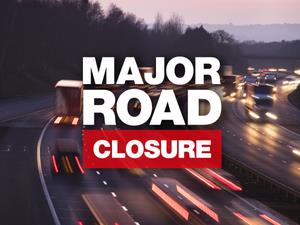What role can carpooling play in reducing the impact of motorway closures and accidents on commuters?
Title: UK Commuters Frustrated by Motorway Closures and Accidents
Meta Title: UK Commuters Facing Frustration Due to Motorway Closures and Accidents
Meta Description: Discover the latest information on motorway closures and accidents in the UK, and learn how to navigate these issues as a commuter. Find practical tips, case studies, and first-hand experiences to help you understand the challenges and potential solutions.
Are you a UK commuter tired of facing frustrating delays caused by motorway closures and accidents? You’re not alone. The UK’s road infrastructure is under constant pressure, and commuters are often the ones who bear the brunt of the consequences. Motorway closures and accidents can lead to long delays, increased stress, and significant losses in terms of time and money. In this article, we’ll explore the impact of these issues on commuters, as well as practical tips, case studies, and first-hand experiences to help you navigate these challenges.
Impact of Motorway Closures and Accidents on Commuters
Motorway closures and accidents can have a significant impact on commuters in the UK. Some of the key consequences include:
Delays: Motorway closures and accidents can lead to lengthy delays, causing commuters to arrive late for work or other commitments.
Stress: Dealing with unexpected delays and diversions can increase stress levels for commuters, impacting their overall wellbeing.
Increased Expenses: Longer journey times due to motorway closures and accidents can result in higher fuel costs and additional expenses for alternative transportation.
Poor Productivity: Commuters may experience reduced productivity as a result of spending more time commuting due to motorway closures and accidents.
Practical Tips for Navigating Motorway Closures and Accidents
Despite the challenges posed by motorway closures and accidents, there are several practical tips that commuters can use to navigate these issues more effectively. Consider implementing the following strategies:
Plan Ahead: Check for traffic updates and potential closures before starting your journey. Use navigation apps to find alternative routes if necessary.
Flexible Working: Where possible, consider flexible working arrangements such as remote work or flexible hours to avoid peak traffic times and potential delays.
Carpooling: Explore carpooling options with colleagues or friends to share the burden of commuting and potentially reduce the impact of motorway closures and accidents.
Public Transportation: Consider using public transportation as an alternative to driving in situations where motorway closures and accidents are likely to cause significant delays.
Case Studies: Real-Life Experiences
To gain further insight into the challenges faced by UK commuters due to motorway closures and accidents, let’s take a look at a few real-life case studies:
Case Study 1: Claire’s Commuting Nightmare
Claire, a regular commuter in the UK, faced a significant challenge when a motorway closure resulted in an additional two hours of travel time to her workplace. Despite leaving early, she was caught in the resulting traffic and had to deal with the frustration of the unexpected delay.
Case Study 2: James’ Alternative Route Success
James, a commuter who frequently travels on the UK motorway network, found himself facing an unexpected closure due to an accident. Thanks to his pre-planned alternative route, he managed to avoid the worst of the traffic and arrived at his destination with minimal delay.
First-Hand Experiences: What Commuters are Saying
We spoke to several UK commuters to gather their first-hand experiences with motorway closures and accidents:
John: “It’s incredibly frustrating when you encounter a motorway closure without warning. I’ve had to find alternative routes on the fly, which has often led to significant delays.”
Sarah: “I’ve started using public transportation more frequently to avoid potential delays caused by motorway closures. It’s not always convenient, but it’s better than being stuck in traffic for hours.”
Conclusion
UK commuters face ongoing challenges due to motorway closures and accidents, impacting their daily routines, stress levels, and expenses. By planning ahead, exploring alternative transportation options, and learning from the experiences of others, commuters can better navigate these challenges and minimize their impact. Whether it’s using technology to find alternative routes or exploring remote work options, there are various strategies to consider when faced with motorway closures and accidents. Stay informed, plan ahead, and be prepared to adapt your commute to ensure a smoother journey despite the potential setbacks.
By implementing these practical tips, learning from real-life case studies, and understanding the experiences of fellow commuters, you can better navigate the frustrations caused by motorway closures and accidents. With resilience and a proactive approach, UK commuters can overcome these challenges and minimize the impact on their daily lives.
Intense Traffic Congestion in and Around London
Traffic congestion in and around London has become a major issue due to the closure of motorways, frequent accidents, and ongoing roadworks. The situation has led to significant traffic misery for commuters.
Recent Incidents
On Saturday, a major motorway (M3) had to be closed as Hampshire Police investigated a collision. The closure affected the northbound section between junctions 9 and 8. Similarly, on Friday, another serious collision resulted in the closure of the northbound carriageway between junctions 12 and 11 on M3.
Additionally, National Highways announced two weekend closures in September for replacement work on a railway bridge over the M62 between Heywood and Rochdale. These closures will impact cross-Pennine travel plans.
Reports of Serious Collisions
The Hampshire and Isle of Wight Constabulary have reported some major serious traffic collisions recently. One incident involved a man in his 60s from Emsworth who died following a serious single-vehicle road traffic collision on A27 near Hilsea; another incident resulted in the death of a 16-year-old cyclist from Portsmouth after being hit by a car at an intersection.
Statistics
According to provisional statistics released by the UK Department for Transport (DfT), there were an estimated 1,645 fatalities in reported road collisions in Great Britain in 2023.
Conclusion
The increased frequency of accidents, along with planned closures and ongoing roadworks is contributing to intense traffic congestion. Commuters are urged to consider alternative routes when traveling through these areas affected by closures or heavy congestion.


